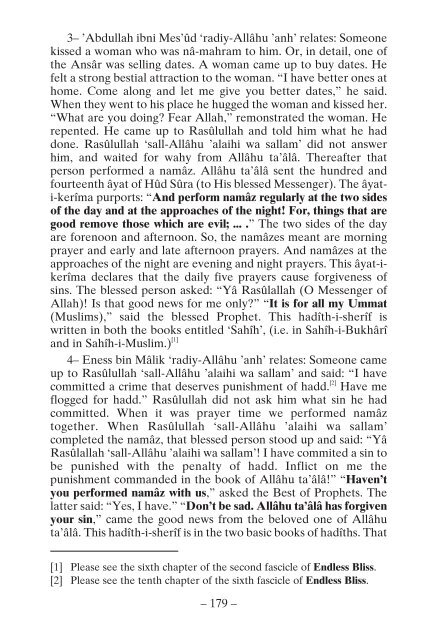Miftah-ul-Janna (Booklet for way to Paradise)
You also want an ePaper? Increase the reach of your titles
YUMPU automatically turns print PDFs into web optimized ePapers that Google loves.
3– ’Abd<strong>ul</strong>lah ibni Mes’ûd ‘radiy-Allâhu ’anh’ relates: Someone<br />
kissed a woman who was nâ-mahram <strong>to</strong> him. Or, in detail, one of<br />
the Ansâr was selling dates. A woman came up <strong>to</strong> buy dates. He<br />
felt a strong bestial attraction <strong>to</strong> the woman. “I have better ones at<br />
home. Come along and let me give you better dates,” he said.<br />
When they went <strong>to</strong> his place he hugged the woman and kissed her.<br />
“What are you doing? Fear Allah,” remonstrated the woman. He<br />
repented. He came up <strong>to</strong> Rasûl<strong>ul</strong>lah and <strong>to</strong>ld him what he had<br />
done. Rasûl<strong>ul</strong>lah ‘sall-Allâhu ’alaihi wa sallam’ did not answer<br />
him, and waited <strong>for</strong> wahy from Allâhu ta’âlâ. Thereafter that<br />
person per<strong>for</strong>med a namâz. Allâhu ta’âlâ sent the hundred and<br />
fourteenth âyat of Hûd Sûra (<strong>to</strong> His blessed Messenger). The âyati-kerîma<br />
purports: “And per<strong>for</strong>m namâz reg<strong>ul</strong>arly at the two sides<br />
of the day and at the approaches of the night! For, things that are<br />
good remove those which are evil; ... .” The two sides of the day<br />
are <strong>for</strong>enoon and afternoon. So, the namâzes meant are morning<br />
prayer and early and late afternoon prayers. And namâzes at the<br />
approaches of the night are evening and night prayers. This âyat-ikerîma<br />
declares that the daily five prayers cause <strong>for</strong>giveness of<br />
sins. The blessed person asked: “Yâ Rasûlallah (O Messenger of<br />
Allah)! Is that good news <strong>for</strong> me only?” “It is <strong>for</strong> all my Ummat<br />
(Muslims),” said the blessed Prophet. This hadîth-i-sherîf is<br />
written in both the books entitled ‘Sahîh’, (i.e. in Sahîh-i-Bukhârî<br />
and in Sahîh-i-Muslim.) [1]<br />
4– Eness bin Mâlik ‘radiy-Allâhu ’anh’ relates: Someone came<br />
up <strong>to</strong> Rasûl<strong>ul</strong>lah ‘sall-Allâhu ’alaihi wa sallam’ and said: “I have<br />
committed a crime that deserves punishment of hadd. [2] Have me<br />
flogged <strong>for</strong> hadd.” Rasûl<strong>ul</strong>lah did not ask him what sin he had<br />
committed. When it was prayer time we per<strong>for</strong>med namâz<br />
<strong>to</strong>gether. When Rasûl<strong>ul</strong>lah ‘sall-Allâhu ’alaihi wa sallam’<br />
completed the namâz, that blessed person s<strong>to</strong>od up and said: “Yâ<br />
Rasûlallah ‘sall-Allâhu ’alaihi wa sallam’! I have commited a sin <strong>to</strong><br />
be punished with the penalty of hadd. Inflict on me the<br />
punishment commanded in the book of Allâhu ta’âlâ!” “Haven’t<br />
you per<strong>for</strong>med namâz with us,” asked the Best of Prophets. The<br />
latter said: “Yes, I have.” “Don’t be sad. Allâhu ta’âlâ has <strong>for</strong>given<br />
your sin,” came the good news from the beloved one of Allâhu<br />
ta’âlâ. This hadîth-i-sherîf is in the two basic books of hadîths. That<br />
[1] Please see the sixth chapter of the second fascicle of Endless Bliss.<br />
[2] Please see the tenth chapter of the sixth fascicle of Endless Bliss.<br />
– 179 –

















